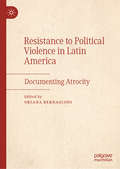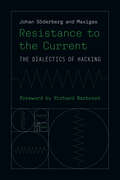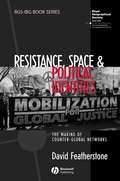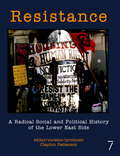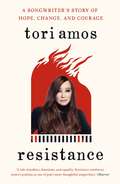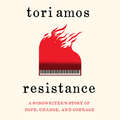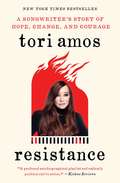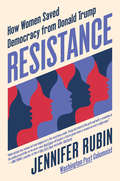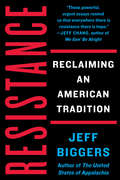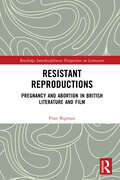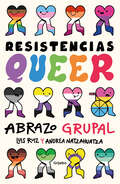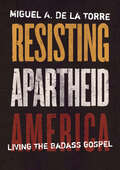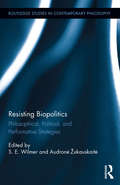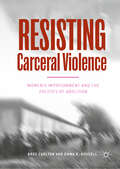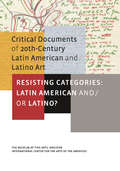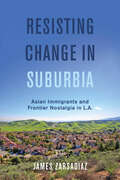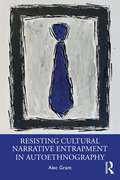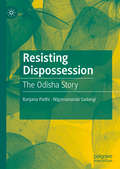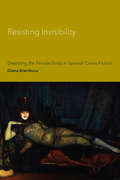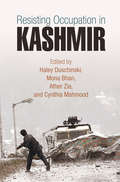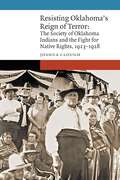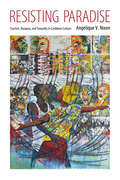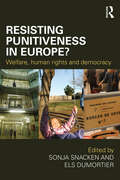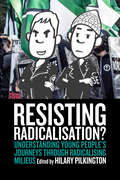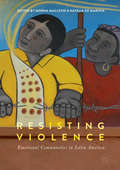- Table View
- List View
Resistance to Political Violence in Latin America: Documenting Atrocity
by Oriana BernasconiThis book analyzes state terror documentation as a form of peaceful resistance to oppressive regimes through substantial research in human rights archives that registered violations perpetrated by Augusto Pinochet’s dictatorship in Chile. The contributors provide in-depth analysis on state violence documentation, denunciation and resistance and how it affected civilians, activists and victims. Additionally, the project introduces research in transitional contexts (post-dictatorship, post-apartheid and post-colonialism) showing the role of documentation practices in achieving truth, reparation and justice. This work will be relevant to academics, students and researchers in the fields of political science, political history, Latin American and memory studies.
Resistance to the Current: The Dialectics of Hacking (Information Policy)
by Johan Soderberg MaxigasHow hacking cultures drive contemporary capitalism and the future of innovation.In Resistance to the Current, Johan Söderberg and Maxigas examine four historical case studies of hacker movements and their roles in shaping the twenty-first-century&’s network society. Based on decades of field work and analysis, this intervention into current debates situates an exploding variety of hacking practices within the contradictions of capitalism. Depoliticized accounts of computing cultures and collaborative production miss their core driver, write Söderberg and Maxigas: the articulation of critique and its recuperation into innovations.Drawing on accounts of building, developing, and running community wireless networks, 3D printers, hackerspaces, and chat protocols, the authors develop a theoretical framework of critique and recuperation to examine how hackers—who have long held a reputation for being underground rebels—transform their outputs from communal, underground experiments to commercial products that benefit the state and capital. This framework allows a dialectical understanding of contemporary social conflicts around technology and innovation. Hackers&’ critiques of contemporary norms spur innovation, while recuperation turns these innovations into commodified products and services. Recuperation threatens the autonomy of hacker collectives, harnessing their outputs for the benefit of a capitalist system.With significant practical implications, this sophisticated multidisciplinary account of technology-oriented movements that seek to challenge capitalism will appeal to science and technology readers interested in innovation studies, user studies, cultural studies, and media and communications.
Resistance, Space and Political Identities: The Making of Counter-Global Networks (RGS-IBG Book Series #62)
by David FeatherstoneUtilizing research on networked struggles in both the 18th-century Atlantic world and our modern day, Resistance, Space and Political Identities: The Making of Counter-Global Networks challenges existing understandings of the relations between space, politics, and resistance to develop an innovative account of networked forms of resistance and political activity. Explores counter-global struggles in both the past and present—including both the 18th-century Atlantic world and contemporary forms of resistance Examines the productive geographies of contestation Foregrounds the solidarities and geographies of connection between different place-based struggles and argues that such solidarities are essential to produce more plural forms of globalization
Resistance: A Radical Social and Political History of the Lower East Side
by Jeff Ferrell Clayton PattersonThis collection of writings and images documents the political history of NYC's Lower East Side, describing the lives and struggles of the radicals, artists, and immigrants that populated and politicized one of America's strangest and most beloved neighborhoods. Current and former residents of the neighborhood explore the social, political, and human landscape of one of America's most storied bohemias. In over fifty chapters, Emma Goldman, Dorothy Day, Christopher Mele, John Macmillan, Jim Feast, Al Orensanz, Allan Antliff, Lynn Stewart, Thomas McEvilly, Frank Morales, and many others cover topics ranging from the early settlement houses and sweatshops to squatters, rioters, artists, activists and organizers. Resistance is jam-packed with fascinating first-person accounts of the battles, triumphs, failures, and lives of a neighborhood that is rapidly being lost to gentrification.
Resistance: A Songwriter's Story of Hope, Change and Courage
by Tori AmosSince the release of her first, career-defining solo album Little Earthquakes, Tori Amos has been one of the music industry's most enduring and ingenious artists. From her unnerving depiction of sexual assault in "Me and a Gun" to her post-9/11 album Scarlet's Walk to her latest album Native Invader, her work has never shied away from intermingling the personal with the political. Amos began playing piano as a teenager for the politically powerful at hotel bars in Washington, D.C., during the formative years of the post-Goldwater and then Koch-led Libertarian and Reaganite movements. The story continues to her time as a hungry artist in L.A. to the subsequent three decades of her formidable music career. Amos explains how she managed to create meaningful, politically resonant work against patriarchal power structures and how her proud declarations of feminism and her fight for the marginalized always proved to be her guiding light. She teaches readers to engage with intention in this tumultuous global climate and speaks directly to supporters of #MeToo and #TimesUp, as well as young people fighting for their rights and visibility in the world. Filled with compassionate guidance and actionable advice-and using some of the most powerful, political songs in Amos's canon-this book is for readers determined to steer the world back in the right direction.
Resistance: A Songwriter's Story of Hope, Change and Courage
by Tori AmosSince the release of her first, career-defining solo album Little Earthquakes, Tori Amos has been one of the music industry's most enduring and ingenious artists. From her unnerving depiction of sexual assault in "Me and a Gun" to her post-9/11 album Scarlet's Walk to her latest album Native Invader, her work has never shied away from intermingling the personal with the political. Amos began playing piano as a teenager for the politically powerful at hotel bars in Washington, D.C., during the formative years of the post-Goldwater and then Koch-led Libertarian and Reaganite movements. The story continues to her time as a hungry artist in L.A. to the subsequent three decades of her formidable music career. Amos explains how she managed to create meaningful, politically resonant work against patriarchal power structures-and how her proud declarations of feminism and her fight for the marginalized always proved to be her guiding light. She teaches readers to engage with intention in this tumultuous global climate and speaks directly to supporters of #MeToo and #TimesUp, as well as young people fighting for their rights and visibility in the world. Filled with compassionate guidance and actionable advice-and using some of the most powerful, political songs in Amos's canon-this book is for readers determined to steer the world back in the right direction.(P) 2020 Simon & Schuster Audio
Resistance: A Songwriter's Story of Hope, Change, and Courage
by Tori AmosNEW YORK TIMES BESTSELLER A timely and passionate call to action for engaging with our current political moment, from the Grammy-nominated and multiplatinum singer-songwriter and New York Times bestselling author Tori Amos.Since the release of her first, career-defining solo album Little Earthquakes, Tori Amos has been one of the music industry&’s most enduring and ingenious artists. From her unnerving depiction of sexual assault in &“Me and a Gun&” to her post-9/11 album, Scarlet&’s Walk, to 2017&’s Native Invader, her work has never shied away from intermingling the personal with the political. From her time as a teenager playing hotel bars in Washington, DC, for the politically powerful to the subsequent three decades of her formidable music career, Amos explains how she managed to create meaningful, politically resonant work against patriarchal power structures—and how her proud declarations of feminism and her fight for the marginalized always proved to be her guiding light. She teaches us to engage with intention in this tumultuous global climate and speaks directly to supporters of #MeToo and Time&’s Up, as well as young people fighting for their rights and visibility in the world. Filled with compassionate guidance and actionable advice—and using some of the most powerful, political songs in Amos&’s canon—Resistance is for anyone determined to steer the world back in the right direction.
Resistance: How Women Saved Democracy from Donald Trump
by Jennifer RubinAn insider’s look at how women defeated Donald Trump, based on interviews with Kamala Harris, Amy Klobuchar, Stacey Abrams, Nancy Pelosi, and many more. Bookended by Donald Trump’s 2016 victory and his 2020 defeat, Resistance tracks a set of dynamic women voters, activists and politicians who rose up when he took the White House and fundamentally changed the political landscape. From the first Women’s March the day after Trump’s inauguration to the Blue Wave in the 2018 midterms to the flood of female presidential candidates in 2020 to the inauguration of Kamala Harris, women from across the ideological spectrum entered the political arena and became energized in a way America had not witnessed in decades. They marched, they organized, they donated vast sums of cash, they ran for office, they made new alliances. And they defeated Donald Trump.Democratic women candidates learned that they could win in large numbers, even in red districts. Black women voters in 2020 surged in Georgia and in suburbs in key swing states. Women across the country voted in greater numbers than in any previous election, flipped the Senate, and ensured victory for the first female Vice President in the nation’s history. While Democrats recorded impressive victories, Republican women delivered critical victories of their own.From the White House to Congress, from activists to protestors, from liberals to conservatives, Resistance delivers the first comprehensive portrait of women’s historic political surge provoked by the horror of President Trump. This is the indelible story of how American women transformed their own lives, vanquished Trump, secured unprecedented positions of power and redefined US politics for decades to come.
Resistance: Reclaiming an American Tradition
by Jeff BiggersThis "powerful, urgent" narrative history of resistance campaigns throughout history and how they affect today's battles (Jeff Chang, author of We Gon’ Be Alright)––from the American Revolution and the defeat of fascism during WWII, to landmark battles for civil rights and the new movements for equity.Across cities, towns, and campuses, Americans are grappling with overwhelming challenges and the daily fallout from the most authoritarian White House policies in recent memory.In this inspiring narrative history, Jeff Biggers reframes today’s battles as a continuum of a vibrant American tradition. Resistance is a chronicle of the courageous resistance movements that have insured the benchmarks of our democracy––movements that served on the front lines of the American Revolution, the defense of the Constitution and Bill of Rights, the defeat of fascism during World War II, and landmark civil rights and environmental protection achievements.Legendary historian Studs Terkel praised Biggers’s The United States of Appalachia as a "how–to book" in the tradition of the American Revolution. With Resistance, Biggers opens a new window into American history and its meaning today. In a recovery of unsung heroes, including Revolutionary forefather Thomas Paine, Resistance is a provocative reconsideration of the American Revolution, bringing alive the early struggles of Indigenous peoples and people of color, and immigration, women’s rights, and environmental justice movements. With lucidity, meticulousness, and wit, Biggers unfolds one of our country’s best–kept secrets: in dealing with the most challenging issues of every generation, resistance to duplicitous civil authority has defined our quintessential American story."Resist we must, resist we will––and as this volume powerfully reminds us, in so doing we are acting on the deepest American instincts." ―Bill McKibben, author of Radio Free Vermont: A Fable of Resistance
Resistant Reproductions: Pregnancy and Abortion in British Literature and Film (Routledge Interdisciplinary Perspectives on Literature)
by Fran BigmanResistant Reproductions asks why narratives of pregnancy and abortion emerged in the early twentieth century and what kinds of stories these narratives conveyed. Is it only once pregnancy becomes plannable that it becomes a story worth telling? Abortion is often considered resistant and feminist, while pregnancy is considered domestic and conventional. How can readings of literary narratives challenge this reductive binary?Resistant Reproductions, the first book-length study of both pregnancy and abortion in British culture, addresses these questions by examining pregnancy narratives, including abortion narratives, in British fiction and film from 1907 to 1967. Fiction became a way for writers to explore what new possibilities of reproductive control would mean for the individual, yet there was also much anxiety about who would have control: individuals or the state. While exploring intimate personal experiences of pregnancy and abortion, Resistant Reproductions also asks how literary narratives used reproductive plots to address political issues of gender, class, and eugenics.
Resistencias queer: Abrazo grupal
by Luis Ruiz Andrea NatzahuatzaFrente a quienes insisten en ver a las personas LGBTQ+ como un peligro, nuestra rebeldía es ser felices, libres y ruidosxs . Hay muchos libros sobre salir del clóset. Este no es uno de ellos. Preferimos, en cambio, preguntarnos cómo podemos construir una sociedad en la que los clósets no existan. Hay que dejar de pensar lo heterosexual y lo cisgénero como «lo normal», leer el mundo con ojos distintos, reconociendo que hay una infinidad de maneras de amar, desear, relacionarnos, ser y expresarnos y que todas son válidas. En estas páginas encontrarás una colección de textos originales sobre temas que a las personas LGBTQ+ nos importan, conceptos clave para entender las discusiones sobre diversidad sexual y de género, historias de las personas rebeldes que lucharon antes que nosotrxs, mucho chismecito queer y herramientas valiosas —¡y divertidas!— para formar comunidad, cuidarnos a nosotrxs mismxs y a las personas con quienes compartimos lucha. Los autores dicen: «Resistir, para las poblaciones LGBTQ+, no es una opción, sino la única forma viable para existir en un mundo que se niega a escuchar nuestras voces». Luis y Andrea, de Abrazo Grupal
Resisting Apartheid America: Living the Badass Gospel
by Miguel A. De La TorreMiguel De La Torre foresees a future America dominated by white nationalists—and equips us with the tools to resist it. In Burying White Privilege, he opened our eyes to white Christians&’ complicity in maintaining racist hierarchy in America. In its sequel, Decolonizing Christianity, he encouraged us to decolonize Christianity and return it to its revolutionary roots. Now, in his conclusion to the trilogy, Miguel A. De La Torre shows us the America on our horizon, should we continue down the path of heretical white Christianity—and the outlook is not bright. Resisting Apartheid America assesses the past and present threads of systemic racism in American politics, from Plymouth Rock to the Capitol on January 6. Sweeping and unsparing in his critique, De La Torre takes on authors revered in Christian theology, including Paul, Augustine, and heroes of the Reformation, aiming to uproot the ideological foundations of racism in Christianity. Following these through lines of oppression, he warns of a decline in democracy and rise in political violence—but equips us with the nonviolent ethical framework to resist this bleak future. Resisting Apartheid America is a clarion call to Christians to remake America in the image of the God of liberation.
Resisting Biopolitics: Philosophical, Political, and Performative Strategies (Routledge Studies in Contemporary Philosophy)
by S. E. Wilmer Audronė ŽukauskaitėThe topic of biopolitics is a timely one, and it has become increasingly important for scholars to reconsider how life is objectified, mobilized, and otherwise bound up in politics. This cutting-edge volume discusses the philosophical, social, and political notions of biopolitics, as well as the ways in which biopower affects all aspects of our lives, including the relationships between the human and nonhuman, the concept of political subjectivity, and the connection between art, science, philosophy, and politics. In addition to tracing the evolving philosophical discourse around biopolitics, this collection researches and explores certain modes of resistance against biopolitical control. Written by leading experts in the field, the book’s chapters investigate resistance across a wide range of areas: politics and biophilosophy, technology and vitalism, creativity and bioethics, and performance. Resisting Biopolitics is an important intervention in contemporary biopolitical theory, looking towards the future of this interdisciplinary field.
Resisting Carceral Violence: Women's Imprisonment and the Politics of Abolition (Critical Criminological Perspectives)
by Bree Carlton Emma K. RussellThis book explores the dramatic evolution of a feminist movement that mobilised to challenge a women’s prison system in crisis. Through in-depth historical research conducted in the Australian state of Victoria that spans the 1980s and 1990s, the authors uncover how incarcerated women have worked productively with feminist activists and community coalitions to expose, critique and resist the conditions and harms of their confinement. Resisting Carceral Violence tells the story of how activists—through a combination of creative direct actions, reformist lobbying and legal challenges—forged an anti-carceral feminist movement that traversed the prison walls. This powerful history provides vital lessons for service providers, social justice advocates and campaigners, academics and students concerned with the violence of incarceration. It calls for a willingness to look beyond the prison and instead embrace creative solutions to broader structural inequalities and social harm.
Resisting Categories: Latin American and/or Latino?
by Mari Carmen Ramirez Hector Olea Tomas Ybarra-FraustoThis first volume of the Critical Documents of 20th-Century Latin American and Latino Art series published by the International Center for the Arts of the Americas at the Museum of Fine Arts, Houston, presents 168 crucial texts written by influential artists, critics, curators, journalists, and intellectuals whose writings shed light on questions relating to what it means to be "Latin American" and/or "Latino."Reinforced within a critical framework, the documents address converging issues, including: the construct of "Latin-ness" itself; the persistent longing for a continental identity; notions of Pan-Latin Americanism; the emergence of collections and exhibitions devoted specifically to "Latin American" or "Latino" art; and multicultural critiques of Latin American and Latino essentialism. The selected documents, many of which have never before been published in English, span from the late fifteenth century to the present day. They encompass key protagonists of this comprehensive history as well as unfamiliar figures, revealing previously unknown facets of the questions and issues at play. The book series complements the thousands of seminal documents now available through the ICAA Documents of 20th-Century Latin American and Latino Art digital archive, http://icaadocs.mfah.org. Together they establish a much-needed intellectual foundation for the exhibition, collection, and interpretation of art produced in Latin America and among Latino populations in the United States.
Resisting Change in Suburbia: Asian Immigrants and Frontier Nostalgia in L.A. (American Crossroads #67)
by James ZarsadiazBetween the 1980s and the first decade of the twenty-first century, Asian Americans in Los Angeles moved toward becoming a racial majority in the communities of the East San Gabriel Valley. By the late 1990s, their "model minority" status resulted in greater influence in local culture, neighborhood politics, and policies regarding the use of suburban space. In the "country living" subdivisions, which featured symbols of Western agrarianism including horse trails, ranch fencing, and Spanish colonial architecture, white homeowners encouraged assimilation and enacted policies suppressing unwanted "changes"—that is, increased density and influence of Asian culture. While some Asian suburbanites challenged whites' concerns, many others did not. Rather, white critics found support from affluent Asian homeowners who also wished to protect their class privilege and suburbia's conservative Anglocentric milieu. In Resisting Change in Suburbia, award-winning historian James Zarsadiaz explains how myths of suburbia, the American West, and the American Dream informed regional planning, suburban design, and ideas about race and belonging.
Resisting Cultural Narrative Entrapment in Autoethnography
by Alec GrantResisting Cultural Narrative Entrapment in Autoethnography delves into the nexus of cultural narratives and takes the reader on a journey through the intricate landscape of identity and cultural critique. Each chapter, enriched with dialogues with 'Ash,' our imaginary interlocutor, presents a profound exploration rooted in the philosophical fabric.This book amplifies the discourse on ontological and epistemological reflections often overlooked in narrative autoethnography. Central to its narrative is the concept of cultural narrative entrapment, meticulously dissected to unveil its philosophical underpinnings. It focuses on probing inquiries, from the essence of resistance to cultural narrative entrapment to its pivotal role in shaping autoethnographic scholarship. Through meticulous textual 'archaeology' chapters unfold, excavating layers of literature to redefine cultural identity and narrative constructs, offering a meta-autoethnographic lens. The discourse evolves, addressing critiques and paradoxes, while inviting readers to engage with the complexities of perception, representation, and the paradoxes of emplotment. Culminating with an illuminating appendix summarising the author's extensive body of work, this book serves as a beacon for scholars and practitioners navigating the nuanced terrain of philosophical autoethnography.This book transcends the boundaries of traditional scholarship, offering a compelling narrative that challenges conventions and ignites intellectual curiosity. It is an indispensable companion for those seeking to unravel the profound intersections of culture, identity, and philosophical inquiry.
Resisting Dispossession: The Odisha Story
by Ranjana Padhi Nigamananda SadangiThe book brings to the reader a set of political and social narratives woven around people’s resistance against big dams, mining and industrial projects, in short, displacement and dispossession in Odisha, India. This saga of dispossession abounds with stories and narratives of ordinary peasants, forest dwellers, fisher folk and landless wage laborers, which make the canvas of resistance history more complete. The book foregrounds these protagonists and the events that marked their lives; they live in the coastal plains as well as the hilly and forested areas of south and south-west Odisha.The authors have chronicled the development trajectory from the construction of the Hirakud Dam in the 1950s to the entry of corporations like POSCO and Vedanta in contemporary times. It thus covers extensive ground in interrogating the nature of industrialization being ushered into the state from post-independent India till today. The book depicts how and why people resist the development juggernaut in a state marked with endemic poverty. In unraveling this complex reality, the book conveys the world view of a vast section of people whose lives and livelihoods are tied up to land, forests, mountains, seas, rivers, lakes, ponds, trees, vines and bushes. These narratives fill a yawning gap in resistance literature in the context of Odisha. In doing so, they resonate with the current predicament of people in other mineral-rich states in Eastern India. The book is an endeavour to bring Odisha on the map of resistance politics and social movements in India and across the world.
Resisting Invisibility: Detecting the Female Body in Spanish Crime Fiction (Toronto Iberic)
by Diana AramburuEngaging with pre-feminist and male-authored crime literature, Resisting Invisibility offers a comparative reading of women’s bodies as represented in Spanish crime literature from the mid-nineteenth century to the present. Utilizing the twin concepts of visibility and invisibility, the book establishes a genealogy of differing viewpoints regarding women’s positions in these narratives, before and after the birth of the modern Spanish female detective. This examination of the politics of female visibility expands our understanding of the aesthetic regimes that have governed the female body from the early phases of the genre’s evolution. While most scholars understand the feminization of the crime genre as a response to second-wave feminism, Resisting Invisibility demonstrates that even in the earliest representations of delinquent women, the politics surrounding the female body are problematized and are more complex than previously conceptualized. Drawing on gender and queer studies, Resisting Invisibility investigates the gendering of crime fiction, forcing us to reconsider the literary history of female visibility and prompting us to establish an alternative genealogy for Spanish crime literature.
Resisting Occupation in Kashmir: Military Occupation And Women's Activism In Kashmir (The Ethnography of Political Violence)
by Mona Bhan Haley Duschinski Ather Zia Cynthia MahmoodThe last decade has been a transformative period in Kashmir, the hotly contested and densely militarized border territory located high in the Himalayan mountains between India and Pakistan. Suppressed and unheard, Kashmiri political aspirations were subordinated to larger geopolitical concerns—by opposing governments laying claim to Kashmir, by security experts promoting bilateral peace settlements in the region, and by academic researchers studying the conflict. But since 2008, Kashmiris who grew up in the midst of armed insurgency and counterinsurgency warfare have been deploying new strategies for challenging India's state and military apparatus and projecting their legal and political claims for freedom from Indian rule to global audiences. Resisting Occupation in Kashmir analyzes the social and legal logic of India's occupation of Kashmir in relation to colonialism, militarization, power, democracy, and sovereignty. It also traces how Kashmiri youth are drawing on the region's long history of armed rebellion against Indian domination to reimagine the freedom struggle in the twenty-first century.Resisting Occupation in Kashmir presents new ways of thinking and writing about Kashmir that cross conventional boundaries and point toward alternative ways of conceptualizing the past, present, and future of the region. The volume brings together junior and senior scholars from various disciplinary backgrounds who have conducted extensive fieldwork during the past decade in various regions of Kashmir. The contributors, many of whom were born and raised during the peak of the conflict in the 1990s, offer ethnographically grounded perspectives on contemporary social, legal, and political life in ways that demonstrate the multiplicity of experiences of Kashmiri communities. The essays highlight the ways in which this scholarly orientation—built through collaboration and dialogue across different kinds of borders—offers a new critical approach to Kashmir studies at this transformative and generative moment.Contributors: Mona Bhan, Haley Duschinski, Farrukh Faheem, Gowhar Fazili, Bruce Hoffman, Mohamad Junaid, Seema Kazi, Ershad Mahmud, Cynthia Mahmood, Saiba Varma, Ather Zia.
Resisting Oklahoma's Reign of Terror: The Society of Oklahoma Indians and the Fight for Native Rights, 1923–1928 (New Visions in Native American and Indigenous Studies)
by Dr. Joshua CloughThe oil and natural gas boom in pre–World War I Oklahoma brought unbelievable wealth to thousands of tribal citizens in the state on whose lands these minerals were discovered. However, as Angie Debo recognizes in her seminal study of the period, And Still the Waters Run, and, more recently, as David Grann does in Killers of the Flower Moon, this affluence placed Natives in the crosshairs of unscrupulous individuals. As a result, this era was also marked by two of the most heinous episodes of racial violence in the state&’s history: the Tulsa Race Massacre of 1921 and the Osage Murders between 1921 and 1925. In Resisting Oklahoma&’s Reign of Terror Joshua Clough details the responses of one largely forgotten Native organization—the Society of Oklahoma Indians (SOI)—to the violence and pillaging of tribal resources during the 1920s. Clough provides historical understanding of its formation and its shared values of intertribal unity, Native suffrage, and protection of Native property. He also reveals why reform efforts were nearly impossible in 1920s Oklahoma and how this historical perspective informs today&’s conflicts between the state and its Indigenous inhabitants. Through this examination of the SOI, Clough fills the historiographic gap regarding formal Native resistance between the dissolution of the national Society of American Indians in 1923 and the formation of the National Congress of American Indians in 1944. Dismissed or overlooked for a century as an inconsequential Native activist organization, the history of the SOI, when examined carefully, reveals the sophistication and determination of tribal members in their struggle to prevent depredations on their persons and property.
Resisting Paradise: Tourism, Diaspora, and Sexuality in Caribbean Culture (Caribbean Studies Series)
by Angelique V. NixonWinner of the Caribbean Studies Association's 2016 Barbara T. Christian Award for Best Book in the Humanities Tourists flock to the Caribbean for its beaches and spread more than just blankets and dollars. Indeed, tourism has overly affected the culture there. Resisting Paradise explores the import of both tourism and diaspora in shaping Caribbean identity. It examines Caribbean writers and others who confront the region's overdependence on the tourist industry and the many ways that tourism continues the legacy of colonialism. Angelique V. Nixon interrogates the relationship between culture and sex within the production of “paradise” and investigates the ways in which Caribbean writers, artists, and activists respond to and powerfully resist this production. Forms of resistance include critiquing exploitation, challenging dominant historical narratives, exposing tourism's influence on cultural and sexual identity in the Caribbean and its diaspora, and offering alternative models of tourism and travel. Resisting Paradise places emphasis on the Caribbean people and its diasporic subjects as travelers and as cultural workers contributing to alternate and defiant understandings of tourism in the region. Through a unique multidisciplinary approach to comparative literary analysis, interviews, and participant observation, Nixon analyzes the ways Caribbean cultural producers are taking control of representation. While focused mainly on the Anglophone Caribbean, the study covers a range of territories including Antigua, the Bahamas, Grenada, Haiti, Jamaica, as well as Trinidad and Tobago, to deliver a potent critique.
Resisting Punitiveness in Europe?: Welfare, Human Rights and Democracy
by Sonja Snacken Els DumortierThis volume provides an important and exciting contribution to the knowledge on punishment across Europe. Over the past decade, punitiveness has been studied through analyses of ‘increased’ or ‘new’ forms of punishment in western countries. Comparative studies on the other hand have illustrated important differences in levels of punitiveness between these countries and have tried to explain these differences by looking at risk and protective factors. Covering both quantitative and qualitative dimensions, this book focuses on mechanisms interacting with levels of punitiveness that seem to allow room for less punitive (political) choices, especially within a European context: social policies, human rights and a balanced approach to victim rights and public opinion in constitutional democracies. The book is split into three sections: Punishment and Welfare. Chapters look into possible lessons to be learned from characteristics and developments in Scandinavian and some Continental European countries. Punishment and Human Rights. Contributions analyze how human rights in Europe can and do act as a shield against – but sometimes also as a possible motor for – criminalization and penalization. Punishment and Democracy. The increased political attention to victims’ rights and interests and to public opinion surveys in European democracies is discussed as a possible risk for enhanced levels of punitiveness in penal policies and evaluated against the background of research evidence about the wishes and expectations of victims of crime and the ambivalence and ‘polycentric consistency’ of public opinion formations about crime and punishments. This book will be a valuable addition to the literature in this field and will be of interest to students, scholars and policy officials across Europe and elsewhere.
Resisting Radicalisation?: Understanding Young People's Journeys through Radicalising Milieus
by Hilary PilkingtonThis landmark volume of extensive empirical research conducted across Europe explains how, and why, young people become engaged in radical(ising) milieus but also resist radicalisation into violent extremism. Offering a critical perspective on the concept of radicalisation, this volume views it from the perspective of social actors who engage in radicalising milieus but for the most part have not crossed the threshold into violent extremism. It brings together contributions conducted as part of a cross-European (including France, Germany, the Netherlands, Greece, Russia, Turkey, the UK, and beyond) study of young people's engagement in ‘extreme right’ and ‘Islamist’ milieus. It argues that radicalisation is best understood as a relational concept reflecting a social process rooted in relational inequalities but also shaped by interactional and situational dynamics, which not only facilitate but also constrain radicalisation.
Resisting Violence: Emotional Communities in Latin America
by Morna Macleod Natalia De MarinisThis book focuses on emotional engagement in academic research with victims of violence and testimonial documentation in Latin America. It examines the recent history of resistance to violence and political repression in Latin America, highlighting the role of emotions in the political sphere. The authors analyse the role of researchers committed to social change and question the mandate of distance and neutrality in academic research in contexts of extreme violence. They use case studies of social resistance to political violence in Mexico, Guatemala, El Salvador, Nicaragua, Colombia and Chile.
